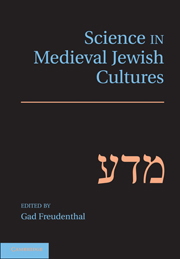Book contents
- Frontmatter
- Contents
- Contributors
- Preface and Acknowledgments
- Introduction: The History of Science in Medieval Jewish Cultures
- Part I The Greek-Arabic Scientific Tradition and Its Appropriation, Adaptation, and Development in Medieval Jewish Cultures, East and West
- Part II Individual Sciences as Studied and Practiced by Medieval Jews
- 5 Logic in Medieval Jewish Culture
- 6 Astronomy among Jews in the Middle Ages
- 7 Interactions between Jewish and Christian Astronomers in the Iberian Peninsula
- 8 The Hebrew Mathematics Culture (Twelfth–Sixteenth Centuries)
- 9 Mathematical and Physical Optics in Medieval Jewish Scientific Thought
- 10 The Evolution of the Genre of the Philosophical-Scientific Commentary
- 11 Latin Scholastic Influences on Late Medieval Hebrew Physics
- 12 Meteorology and Zoology in Medieval Hebrew Texts
- 13 The Mental Faculties and the Psychology of Sleep and Dreams
- 14 Toward a History of Hebrew Astrological Literature
- 15 Astrology in Medieval Jewish Thought (Twelfth–Fourteenth Centuries)
- 16 Astral Magic and Specific Properties (Segullot) in Medieval Jewish Thought
- 17 Medicine among Medieval Jews
- 18 Alchemy in Medieval Jewish Cultures
- 19 The Science of Language among Medieval Jews
- Part III Scientific Knowledge in Context
- Name Index*
- Subject Index*
- References
11 - Latin Scholastic Influences on Late Medieval Hebrew Physics
The State of the Art
from Part II - Individual Sciences as Studied and Practiced by Medieval Jews
Published online by Cambridge University Press: 05 June 2012
- Frontmatter
- Contents
- Contributors
- Preface and Acknowledgments
- Introduction: The History of Science in Medieval Jewish Cultures
- Part I The Greek-Arabic Scientific Tradition and Its Appropriation, Adaptation, and Development in Medieval Jewish Cultures, East and West
- Part II Individual Sciences as Studied and Practiced by Medieval Jews
- 5 Logic in Medieval Jewish Culture
- 6 Astronomy among Jews in the Middle Ages
- 7 Interactions between Jewish and Christian Astronomers in the Iberian Peninsula
- 8 The Hebrew Mathematics Culture (Twelfth–Sixteenth Centuries)
- 9 Mathematical and Physical Optics in Medieval Jewish Scientific Thought
- 10 The Evolution of the Genre of the Philosophical-Scientific Commentary
- 11 Latin Scholastic Influences on Late Medieval Hebrew Physics
- 12 Meteorology and Zoology in Medieval Hebrew Texts
- 13 The Mental Faculties and the Psychology of Sleep and Dreams
- 14 Toward a History of Hebrew Astrological Literature
- 15 Astrology in Medieval Jewish Thought (Twelfth–Fourteenth Centuries)
- 16 Astral Magic and Specific Properties (Segullot) in Medieval Jewish Thought
- 17 Medicine among Medieval Jews
- 18 Alchemy in Medieval Jewish Cultures
- 19 The Science of Language among Medieval Jews
- Part III Scientific Knowledge in Context
- Name Index*
- Subject Index*
- References
Summary
The first decades of the fourteenth century saw incipient changes in Jewish philosophy and science in southwestern Europe. Until then, Arab-Islamic philosophy and science had been its major and almost only source. After 1320, Jewish scholars, especially in Provence, expounded new doctrines and new interpretations of old questions, some of which were not found in Arabic philosophy and science. A number of these new doctrines concerned Aristotelian physics, as found in the Physics and in the De caelo.
According to Shlomo Pines, who published a long essay on this question more than forty years ago, the change was probably due to the “influence” of Scholasticism on fourteenth-century Jewish physics. In his opinion, traces of contemporary discussions of Scholastic physics (and metaphysics) can be found in the works of fourteenth-century Jewish scholars such as Gersonides (1288–1344), Jedaiah Bedershi ha-Penini (1285–ca. 1350), and Ḥasdai Crescas (ca. 1340–1411). Pines tried to show, for example, that the interpretation of the concept of “now” (concerning the possibility of eternity) in Gersonides’ Wars of the Lord is very close to that in the Questions on the Physics by Pseudo-Siger of Brabant, or that Jedaiah ha-Penini's theory of the “discrete and continuous” is very close to that of fourteenth-century Latin Nominalism, especially in William of Ockham (1285–ca. 1350), whereas his doctrine of the influence of the heavenly sphere on heavy and light bodies through a “force” is similar to an idea of Scotism. As a matter of fact, Pines is rather cautious in affirming Gersonides’ and Jedaiah's relationship to Christian doctrines and admits that more evidence is needed. The case of Ḥasdai Crescas might be different, because he was able to point to many more parallels to Crescas’s critique of Aristotle's physics and his new physical doctrines (about matter and about time) in Ockham, in proponents of Scotism such as Gerald Odonis (1290–1349), and in Nicholas Oresme (1323–ca. 1382), Nicholas Bonet (1280–1343), and several other fourteenth-century Christian Schoolmen. In this case, too, however, he remains cautious: “Even if we accept the idea – which is close to being certain – that Crescas is to be placed within the Scholastic framework, one must remember that he maintained a marked independence, and in discussing physical problems related explicitly…to another tradition – the Arabic-Jewish philosophical one.”
- Type
- Chapter
- Information
- Science in Medieval Jewish Cultures , pp. 207 - 216Publisher: Cambridge University PressPrint publication year: 2012



